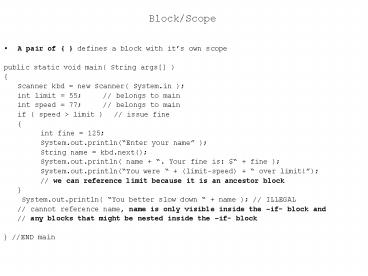Block/Scope - PowerPoint PPT Presentation
Title:
Block/Scope
Description:
A pair of { } defines a block with it s own scope public static void main( String args[] ) {Scanner kbd = new Scanner( System.in ); int limit = 55; // belongs to main – PowerPoint PPT presentation
Number of Views:85
Avg rating:3.0/5.0
Title: Block/Scope
1
Block/Scope
- A pair of defines a block with its own scope
- public static void main( String args )
- Scanner kbd new Scanner( System.in )
- int limit 55 // belongs to main
- int speed 77 // belongs to main
- if ( speed gt limit ) // issue fine
- int fine 125
- System.out.println(Enter your name )
- String name kbd.next()
- System.out.println( name . Your fine is
fine ) - System.out.println(You were (limit-speed)
over limit!) - // we can reference limit because it is an
ancestor block - System.out.println( You better slow down
name ) // ILLEGAL - // cannot reference name, name is only visible
inside the if- block and - // any blocks that might be nested inside the
if- block
2
Block/Scope
- Blocks can be nested to an arbitrary depth.
Variable names cannot be re-used in a nested
block but can be re-used in unrelated blocks.
Analogy You dont name two kids in the same
family with the same name but- two different
families can have kids whose names are identical. - You should distinguish the two identical
variables as the fine belonging to the 1st if-
block or the fine belonging to the 2nd if-
block. Just like two kids named Joe in two
different families. The distinction then becomes
clear. - int limit 55
- int speed 77 // this n belongs to main
- if ( speed gt limit ) // calculate fine
- int overLimit limit-speed
- if (overLimit gt 30 )
- int fine 200
- System.out.println(You owe fine )
- else
- int fine 100 // this variable is not the
same as in above block - System.out.println(You owe fine )
3
Typical uses of blocks
- public static void main(String args)
- Scanner kbd new Scanner( System.in )
- int sum 0
- while (sum lt 80) // while loop soon to be
explained fully - System.out.print( Enter a number )
- int val kbd.nextInt()
- sum val // i.e. sum sum val
- System.out.println( Sum is sum )
- Rule of usage Never declare a variable to have
wider scope that needed to accomplish its
purpose. Our val variable is only needed inside
the accumulation loop. Thus we dont declare it
at same level as sum.































